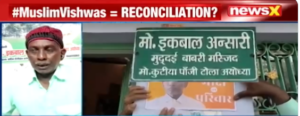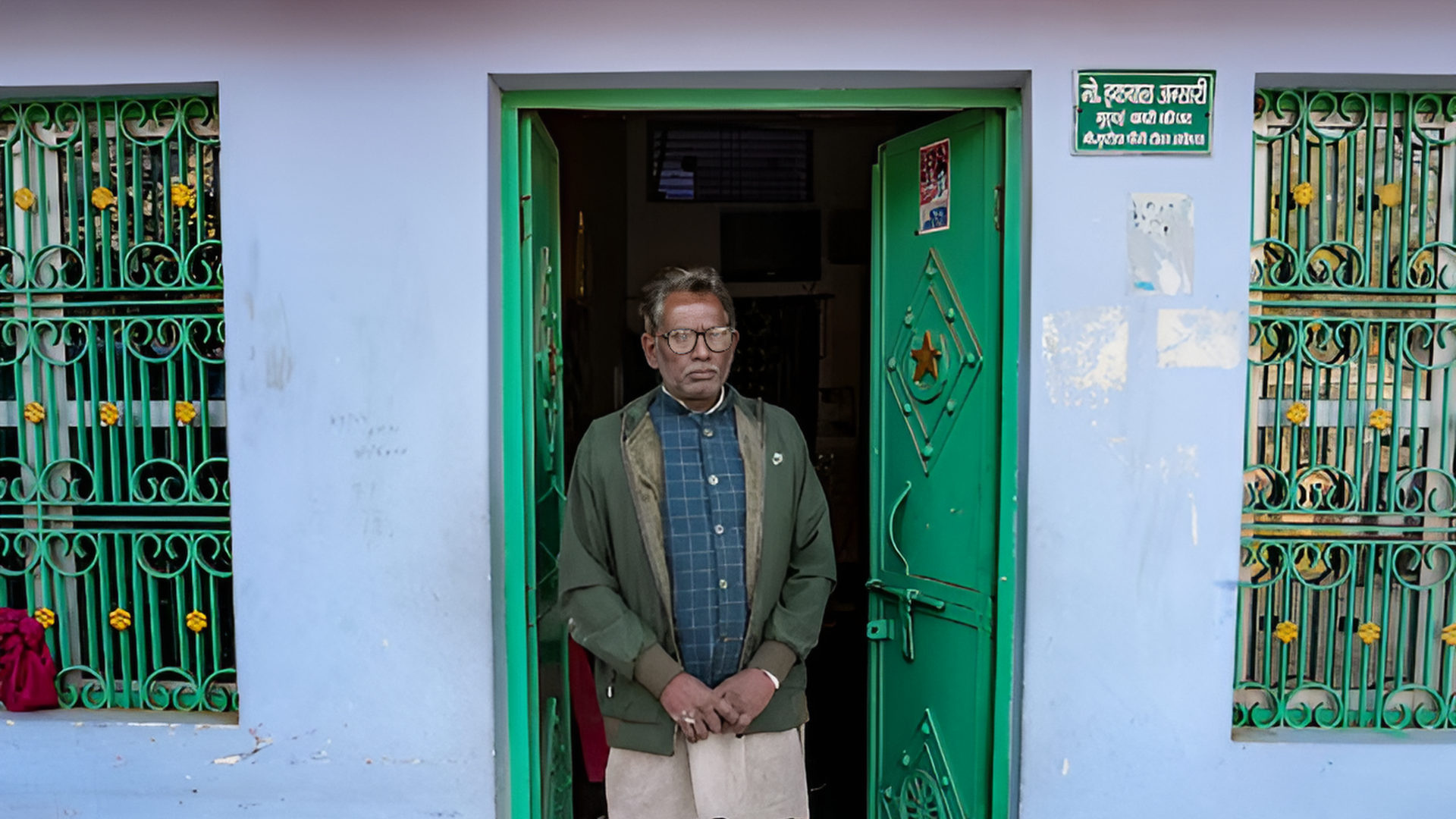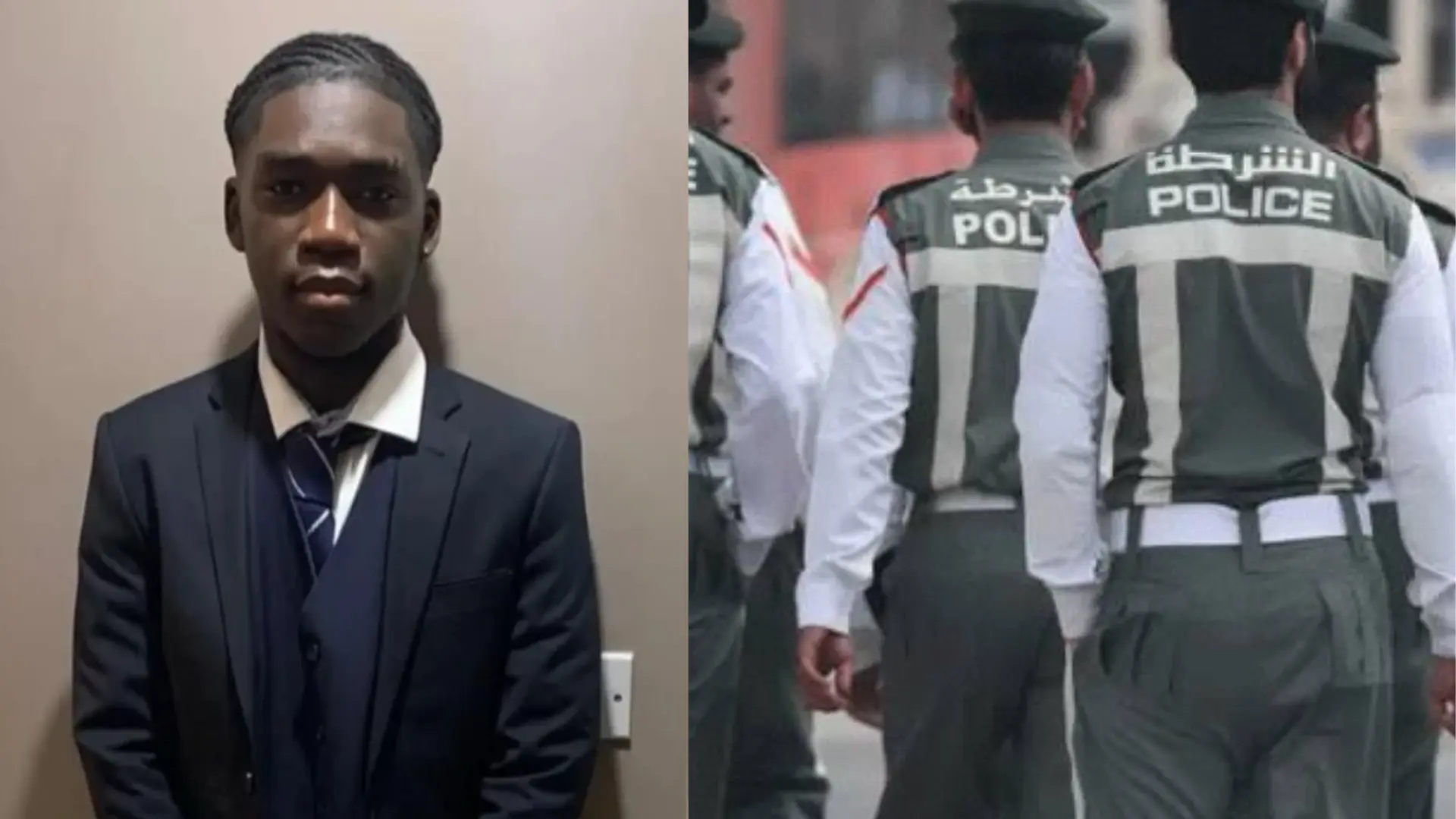Yesterday marked Prime Minister Narendra Modi’s inaugural visit to the Ram Mandir in Ayodhya since the sacred pran pratishtha ceremony held earlier this year in January. Following this historic occasion, PM Modi embarked on a spirited road show. However, amidst the fervor of the moment, an intriguing sight unfolded as the cameras captured Iqbal Ansari, a figure synonymous with the Babri Masjid litigation, standing outside his residence in Ayodhya. Holding a poster emblazoned with the words “Mai Hu Modi Ka Pariwar” (I am Modi’s Family), Ansari’s presence, juxtaposed with his legal history, added a unique dimension to the day’s events. Above the poster, a simple yet profound plate bore the inscription “Iqbal Ansari – Babri Masjid litigant,” encapsulating the complexity and convergence of narratives in Ayodhya.
Who Is Iqbal Ansari?

Iqbal Ansari stands as one of the pivotal litigants in the Ram Mandir – Babri Masjid Dispute. He is the son of Hasim Ansari, the primary plaintiff in the title suit initiated back in 1961. Born in 1921 in Ayodhya, Ansari was the first to lodge the suit in the Fizabad court. His history is marked with resilience, having endured a two-year imprisonment in 1952 for reciting the Azan in the Babri Masjid. Affectionately known as Hasim Chacha in Ayodhya, he shared a close bond with the Akhara Parishad president, Mahant Gyandas, often commuting together to court on a rickshaw. Their efforts to reconcile the dispute post the 2010 Allahabad High Court Verdict illustrate their shared commitment to resolution.
Over five decades, Ansari steadfastly rejected out-of-court settlements, demonstrating unwavering faith in the country’s legal system. Following Hasim Ansari’s passing in 2016, his son Iqbal Ansari assumed responsibility for the case. Residing in Mohalla of Kothiya Panji Tola in Ayodhya, Iqbal Ansari is renowned for resolving community issues, earning him the endearing title of Netaji among locals. Despite being the secondary litigant after his father, he was among the first voices to welcome the Supreme Court’s 2019 verdict.
Today, Iqbal Ansari’s nameplate still bears the inscription “Babri Masjid litigant,” underscoring the enduring significance of the Ayodhya dispute to his identity. Even after the Supreme Court’s verdict and the inauguration of the Ram Mandir, Ansari has openly declared his affiliation with Modi’s Pariwar. This gesture, transcending mere symbolism, merits historical acknowledgment and scrutiny.
In a contemporary India where fearmongers warned of heightened Hindu nationalism and alleged Muslim persecution under Modi’s BJP, Ansari’s gesture carries profound implications. The resolution of the land dispute, the construction of the Mandir, and the allocation of a site for the Masjid have ushered in a new era for Ayodhya. The town experiences unprecedented economic growth, while communal harmony persists unabated.
In an exclusive NewsX interview with the man himself Iqbal Ansari shares his views on the same:
“Iqbal Ansari’s Special Welcome To PM Modi With ‘ Modi Ka Pariwar’ (pamphlet)”
Look, our question is about Ayodhya, the revered land of Ayodhya, which is sacred for Hindus, Muslims, Sikhs, Christians—Ayodhya belongs to everyone. Whoever comes to Ayodhya, comes with faith. PM Narendra Modi started his election campaign from Ayodhya, sought the blessings of Lord Rama, and then carried out a roadshow. We are also citizens of this country, and as many people as there are in this country, I consider them all my family. When the Prime Minister came to Ayodhya and held a roadshow, all the people of Ayodhya were present. We also tried to join in, to show that we too are a part of PM Modi’s family.
“With Time The City Witnessed Development”
Ayodhya, a city steeped in faith, where the roots of everyone’s beliefs run deep. But once upon a time, development seemed like a distant dream. However, fast forward to today Ayodhya has undergone a remarkable transformation. An airport now graces its skyline, connecting it to the world beyond. A bustling railway station stands as a symbol of progress, and well-paved roads weave through its vibrant streets. Ayodhya has truly blossomed into a sight to behold, captivating the hearts of all who visit.
“The Bhaichara Between Hindu – Muslim Before And After Ram Mandir”
Look, on November 9th, when the Supreme Court delivered its verdict on the temple and mosque, Muslims across the country showed respect. The spirit of brotherhood has always existed, and it has never faded away. Today, as the temple stands ready, adorned with celebration and the worship of Ram Lalla, people from all over the country and abroad have come, and not a leaf has stirred, no complaints have been uttered. So, when all Muslims have come together, we are also united.
The Building Of Mosque In Ayodhya
The Supreme Court has allocated 5 acres of land, granting it to the Sunni Central Waqf Board, with zafar farooqui as its chairman. Now, when will they develop it remains a question. So far, no Muslim in the country has raised any complaints because where the land for the mosque was given, there already exists a mosque. Muslims do not discuss matters that used to create tensions between Hindus and Muslims anymore. If the need arises, the local people will take action.
The Moral From The Mandir – Masjid Dispute
The foundation of our nation should be built upon harmony between Hindus and Muslims, reflecting the syncretic culture of the Ganga-Jamuna tradition. It should embody the principle of inclusive development for all, governed by a uniform law that applies to everyone. The level of brotherhood in our country should be so profound that it becomes a model for the entire world. There should be no room for hatred between Hindus and Muslims. In Ayodhya, people of every faith and caste reside, where all deities are revered, yet there is no conflict between Hindu and Muslim gods and goddesses.
How Evident Is Sabka Sath Sabka Vikaas
Some things are evident that whatever laws are made, they are made for everyone. It’s happening, there is no discrimination anywhere, if someone is getting ration, everyone is getting it.
For Iqbal Ansari, his declaration aligning with Modi’s Pariwar signifies more than political aspirations or social media influence. It reflects a deeper sentiment rooted in the evolution of his personal journey and the broader narrative of reconciliation in Ayodhya.
Watch The Interview Here:
#MuslimVishwas | The Babri-Masjid Litigant Iqbal Ansari talks about Modi ka Parivar and infrastructural development In Ayodhya exclusively on NewsX.
Watch the Exclusive interview with @ilah108 only on #NewsXhttps://t.co/I89w3DCmIs#AyodhyaRamMandir #AyodhyaPulse #IqbalAnsari… pic.twitter.com/5G1zgOPuET
— NewsX World (@NewsX) May 6, 2024
















